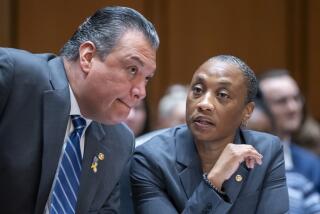Reagan Scuttles Contras Aid Deal : Bill Is in Doubt After Bipartisan Effort Is Rejected
- Share via
WASHINGTON — President Reagan on Wednesday scuttled the efforts of Senate Republicans to forge a broad bipartisan compromise that would have won easy congressional approval of $100 million in aid for the Nicaraguan rebels.
Without such a compromise, Republican leaders conceded, they will be scrambling for enough support to pass the measure when it is brought to a vote today in the GOP-controlled Senate. “I think we’re going to be stretching to get the 50th and 51st vote,” said Sen. Richard G. Lugar (R-Ind.), chairman of the Foreign Relations Committee.
Came as Disappointment
The stalemate came as a disappointment to many Reagan supporters who had hoped that the recent incursion of Sandinista troops into Honduras would generate fresh congressional support for the Nicaraguan rebels, called contras . Lugar said he believed that developments along the Nicaraguan-Honduran border had not changed any votes in the Senate.
“The votes are more based on the bill than what is occurring in Honduras,” he said. “I’ve yet to see a single person in my vote count that has changed because of what has happened in the last 72 hours.”
Negotiations between Senate Republican and Democratic leaders broke down when the President’s national security adviser, John M. Poindexter, joined the talks and reiterated White House opposition to key elements of the compromise under discussion.
Sen. Jim Sasser (D-Tenn.), a central figure in the compromise talks, said Poindexter “steamed in there at flank speed” and “torpedoed” the Democrats’ proposal for compromise. But Republicans involved in the meeting insisted that Poindexter was not primarily responsible for the breakdown in negotiations.
“Adm. Poindexter’s thoughts were always important to us, but he didn’t veto anything,” Lugar said. “He did not enter at flank speed or any speed.”
Although the President already had agreed to withhold $75 million of the aid for a 90-day period while he seeks a diplomatic solution, Democrats were asking for two additional concessions--a promise that the United States would enter into bilateral talks with the Nicaraguan government and a requirement that the bulk of the money would not be released without a second affirmative vote of Congress.
While the White House remains opposed to both proposals, Republicans and Democrats disagreed on which of the two caused the negotiations to disintegrate. Sasser said they fell apart when Poindexter rejected the idea of bilateral talks, but Lugar contended that the talks broke up when Senate Minority Leader Robert C. Byrd (D-W. Va.) insisted on a second vote.
Strong Momentum
Had the negotiations succeeded, Republicans estimated that the President’s proposal would have easily passed the Senate by a substantial margin--giving it strong momentum when the subject comes up again April 15 in the House, which rejected a proposed contra aid package by a narrow margin last week.
Democrats vowed to press their ideas by offering a number of amendments on the Senate floor today, and Lugar acknowledged that an amendment calling for bilateral negotiations between the United States and the Sandinista government might be adopted, despite Reagan’s opposition.
Assistant Minority Leader Alan Cranston (D-Calif.) said that, while four Democratic amendments will be offered today, only one is expected to succeed. It would call on the Administration to conduct bilateral negotiations with the Sandinistas if they agree to a cease-fire and a restoration of civil rights.
Although the Senate is expected to defeat an amendment requiring a second affirmative congressional vote to release the money, Cranston predicted that such a provision would succeed in the Democratic-controlled House.
Talks Never Took Place
It was not the first time that Senate Democrats had demanded bilateral talks in exchange for approval of contra aid. Last year, Reagan won Senate support for his request for $27 million in so-called non-lethal aid for the contras by promising that he would negotiate with the Sandinistas. However, such talks never took place.
The measure being debated by the Senate, which would provide $25 million in non-military help and $75 million in military aid, is similar to the executive order that Reagan offered as an initial compromise last week in an unsuccessful effort to win House support for aiding the contras.
In addition to a 90-day delay in funding for offensive weapons, it calls for a reorganization of the contras and establishes a five-member commission appointed by Congress to monitor the Administration’s diplomatic efforts.
Focused on GOP Holdouts
After failing to win Democratic support for the plan, Senate GOP leaders focused on a few Republican holdouts, including Sens. Nancy Landon Kassebaum of Kansas and William S. Cohen of Maine. To meet their requests, the legislation was altered slightly to impose stronger requirements on the contras to develop political as well as military objectives.
One Democrat, Sen. Sam Nunn of Georgia, was persuaded to support the legislation when he received assurances in writing from the President that the contras would be encouraged to foster democracy in Nicaragua.
But in their efforts to win the support of conservative and moderate Democrats, Republican leaders were running the risk of losing the backing of conservatives in their own party, such as Sen. Jesse Helms of North Carolina. “Certain amendments could have some people entering the front door and others leaving the back door,” Lugar said.
Cranston said that the Nicaraguan incursion into Honduras actually “backfired” for the Administration. It not only raised Democratic concern about further U.S. involvement in the region, he said, but it also made Republican conservatives less willing to compromise because they see the situation as even more urgent.
More to Read
Sign up for Essential California
The most important California stories and recommendations in your inbox every morning.
You may occasionally receive promotional content from the Los Angeles Times.









